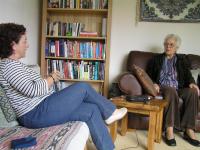Oral History: asking different types of questions

Benita Mendiola being interviewed by Maite San Juan
Introduction
The value of oral history lies in giving a voice to those that have traditionally been marginalised from official histories, fro example, women, migrants, the working classes, gay people, etc. Oral history also provides an informal insight into important events that happened in the past and an understanding of how those affected by such events experienced them.
In order to encourage the interviewee to share their views, opinions and beliefs on the issues that affected them, it is important to ask the right kinds of questions.
Objectives
In these activities, you will familiarise yourself with the type of questions that should be asked during a life history interview in order to prompt interviewees to share their experiences in a rich and enlightening way.
Activity 1: Types of questions when conducting a life history interview
In this activity you will learn to differentiate between certain question types: open questions, contextual questions and closed questions.
Instruction
Read the following list of questions. Decide which could be categorised as open questions, contextual questions and closed questions. Rewrite, or copy and paste the questions in the appropriate boxes.
Open the 'help' box to find more information on how to define these different question types.
- What did your father do for a living?
- When and where were you born?
- How did you find out that the war had started?
- What did your father say to you in that letter?
- Did you say your mother was a member of the Communist Party?
- In what way did you feel alienated when you arrived in Paris?
- How did your parents explain to you that you were going to be evacuated?
- So, were you the eldest daughter?
Now click the link below to listen to the following extract from an interview with a gentleman called CORSINO, and indicate which types of questions the interviewer asks the interviewee. Mark the correct option below. Tick any that apply.
© Irina Nelson and Alicia Pozo-Gutierrez - University of Southampton / Padmini Broomfield - Oral Historian / This work is licensed under a Creative Commons Attribution-NonCommercial-ShareAlike 3.0 Unported License.
Created using the LOC Tool, University of Southampton